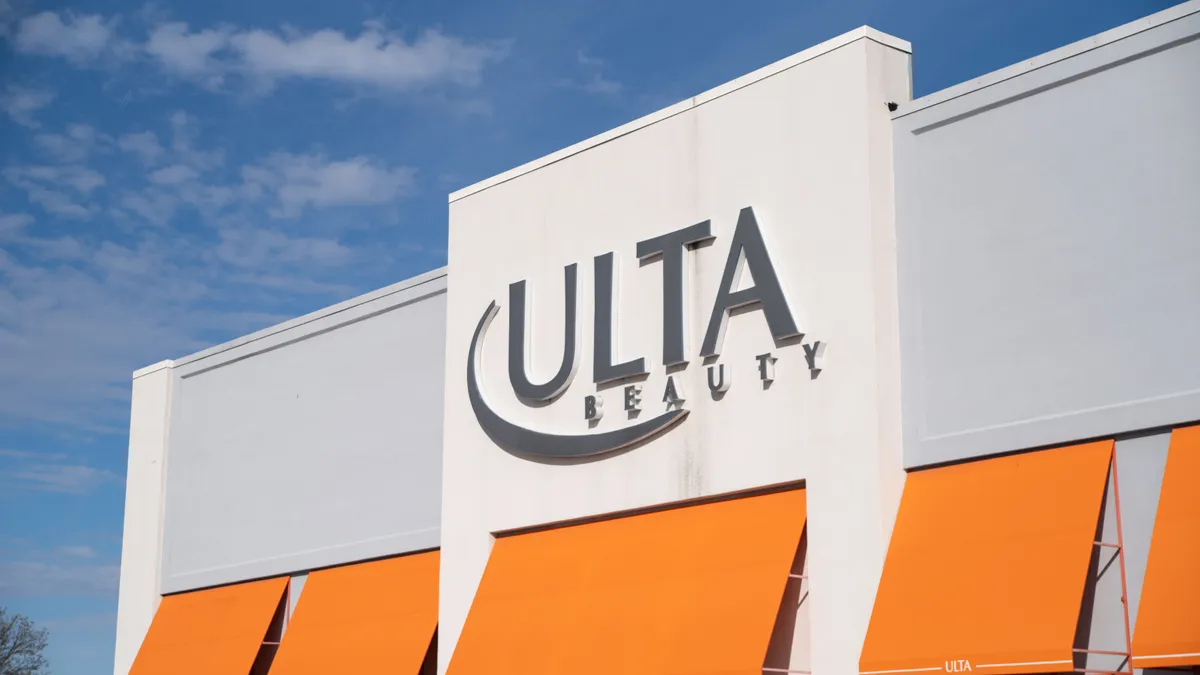Dive Brief:
-
COVID-19 cut Ulta's net sales by a third from the year prior to $1.2 billion in the first quarter. Comparable sales were also down a staggering 35%, thanks to a 39% decline in transactions, according to a company press release.
-
Gross profit was cut in half, falling over $300 million from the previous year, and the retailer recorded an operating loss of $102 million, compared to operating income of $238 million the year prior. Profits fell 141% to a net loss of $79 million.
-
As a result of the pandemic, Ulta trimmed its expansion target from a planned 75 new stores in 2020 to between 30 and 40.
Dive Insight:
While comps for Ulta's e-commerce business increased over 100% in the quarter, according to executives, that wasn't enough to offset the loss from brick-and-mortar stores, which regularly account for roughly 80% of the retailer's revenues.
The retailer's locations have been shuttered since March 19, but as of Thursday, 333 of its 1,200-plus stores had reopened. CEO Mary Dillon noted on a conference call with analysts that the company plans to have "the vast majority" reopened in some capacity by the end of June. Store openings will vary by location, with some open for just curbside pickup, some curbside pickup and retail, and some with "a limited service offering."
All reopened stores will start with reduced hours and will enforce safety measures like increased cleaning, one-way aisles, limited occupancy and associate wellness checks. Associates will also be required to wear masks. But the retailer's in-store experience will be changing in bigger ways than that. For the time being, product testers will be available for viewing only, and in areas where salons are open, services are by appointment only and social distancing will be enforced between stations.
In the place of a more physical experience, Ulta is pushing its Glamlab tool in the app. Dillon noted that engagement has increased nearly five times since the pandemic started, and the company has made adding products and experiences in Glamlab one of five key focus areas. The others include: improving the omnichannel experience through increased shipping capacity; accelerating gains in skincare, haircare and wellness; increasing personalization and spend per member in the Ultamate rewards program; and developing a cost structure that will "enable us to weather economic challenges while also supporting investment."
While the pandemic has in no way been easy on Ulta, as evidenced by big hits to key metrics, executives highlighted several positive signs, including flat comp sales at reopened stores, engagement online from previously in-store only guests, market share gains across all prestige categories online, and the success of certain categories over others. Although comps declined in every category, skincare, haircare, bath and nail all increased as a percentage of sales.
"As we look beyond the reopening process, we're adjusting our plans for the rest of 2020," Dillon said. "Consumer safety concerns, macroeconomic pressures and the risk of a resurgence in the infection rate are dynamics that might constrain demand for the rest of the year. As a result, we are reimagining holiday, rethinking our tent-pole events and continuously looking for opportunities to reduce costs."
The company's shifting plans include delaying some store openings to 2021, decreasing the retailer's original ambitions for 75 new locations this year by about 35 to 45. Rival Sephora had announced plans for 100 new North America stores in February, though when asked if the pandemic has changed those plans at all, the retailer told Retail Dive it had nothing further to share.
At Ulta, the pandemic has not only slowed store openings in the short-term, but also potentially changed how the retailer thinks about its store fleet in the future.
"While we believe there's opportunity to open more stores and reach new guests, we are also evaluating our long-term store target in the U.S., given the acceleration we are experiencing with our e-commerce business," CFO Scott Settersten said.
















